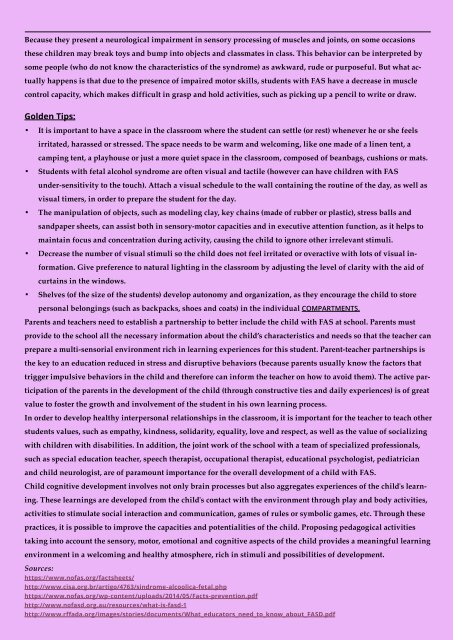NHEG-Magazine-September-October
You also want an ePaper? Increase the reach of your titles
YUMPU automatically turns print PDFs into web optimized ePapers that Google loves.
www.NewHeightsEducation.org<br />
Because they present a neurological impairment in sensory processing of muscles and joints, on some occasions<br />
these children may break toys and bump into objects and classmates in class. This behavior can be interpreted by<br />
some people (who do not know the characteristics of the syndrome) as awkward, rude or purposeful. But what actually<br />
happens is that due to the presence of impaired motor skills, students with FAS have a decrease in muscle<br />
control capacity, which makes difficult in grasp and hold activities, such as picking up a pencil to write or draw.<br />
Golden Tips:<br />
• It is important to have a space in the classroom where the student can settle (or rest) whenever he or she feels<br />
irritated, harassed or stressed. The space needs to be warm and welcoming, like one made of a linen tent, a<br />
camping tent, a playhouse or just a more quiet space in the classroom, composed of beanbags, cushions or mats.<br />
• Students with fetal alcohol syndrome are often visual and tactile (however can have children with FAS<br />
under-sensitivity to the touch). Attach a visual schedule to the wall containing the routine of the day, as well as<br />
visual timers, in order to prepare the student for the day.<br />
• The manipulation of objects, such as modeling clay, key chains (made of rubber or plastic), stress balls and<br />
sandpaper sheets, can assist both in sensory-motor capacities and in executive attention function, as it helps to<br />
maintain focus and concentration during activity, causing the child to ignore other irrelevant stimuli.<br />
• Decrease the number of visual stimuli so the child does not feel irritated or overactive with lots of visual information.<br />
Give preference to natural lighting in the classroom by adjusting the level of clarity with the aid of<br />
curtains in the windows.<br />
• Shelves (of the size of the students) develop autonomy and organization, as they encourage the child to store<br />
personal belongings (such as backpacks, shoes and coats) in the individual COMPARTMENTS.<br />
Parents and teachers need to establish a partnership to better include the child with FAS at school. Parents must<br />
provide to the school all the necessary information about the child’s characteristics and needs so that the teacher can<br />
prepare a multi-sensorial environment rich in learning experiences for this student. Parent-teacher partnerships is<br />
the key to an education reduced in stress and disruptive behaviors (because parents usually know the factors that<br />
trigger impulsive behaviors in the child and therefore can inform the teacher on how to avoid them). The active participation<br />
of the parents in the development of the child (through constructive ties and daily experiences) is of great<br />
value to foster the growth and involvement of the student in his own learning process.<br />
In order to develop healthy interpersonal relationships in the classroom, it is important for the teacher to teach other<br />
students values, such as empathy, kindness, solidarity, equality, love and respect, as well as the value of socializing<br />
with children with disabilities. In addition, the joint work of the school with a team of specialized professionals,<br />
such as special education teacher, speech therapist, occupational therapist, educational psychologist, pediatrician<br />
and child neurologist, are of paramount importance for the overall development of a child with FAS.<br />
Child cognitive development involves not only brain processes but also aggregates experiences of the child's learning.<br />
These learnings are developed from the child's contact with the environment through play and body activities,<br />
activities to stimulate social interaction and communication, games of rules or symbolic games, etc. Through these<br />
practices, it is possible to improve the capacities and potentialities of the child. Proposing pedagogical activities<br />
taking into account the sensory, motor, emotional and cognitive aspects of the child provides a meaningful learning<br />
environment in a welcoming and healthy atmosphere, rich in stimuli and possibilities of development.<br />
Sources:<br />
https://www.nofas.org/factsheets/<br />
http://www.cisa.org.br/artigo/4763/sindrome-alcoolica-fetal.php<br />
https://www.nofas.org/wp-content/uploads/2014/05/Facts-prevention.pdf<br />
http://www.nofasd.org.au/resources/what-is-fasd-1<br />
http://www.rffada.org/images/stories/documents/What_educators_need_to_know_about_FASD.pdf


















